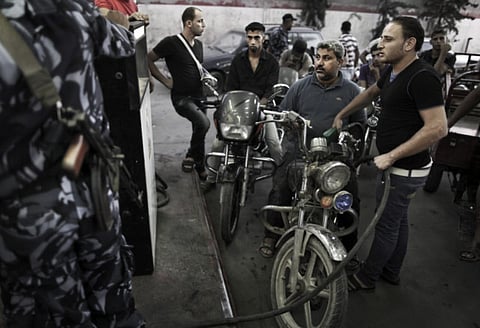Major fuel shortage hits Gaza
Power plants affected as Hamas blames Fatah for tightening the blockade

Ramallah: A serious petrol shortage is being experienced in Gaza as a result of the ruling by the General Directorate of Petroleum in Ramallah that Gaza-based petrol stations must pay cash upfront when ordering their petrol supplies.
The shortage has had a serious effect on the daily life of Palestinians in the coastal strip. Criticizing the ruling, Gaza’s ruling party Hamas has argued that it is motivated by a desire to tighten the blockade on Gaza.
“The petrol shortage in Gaza is one of the most serious crises Gaza faces given that petrol is directly connected to the power generating plants,” said Ehab Al Ghosain, the official spokesman for the Hamas government in the Gaza Strip in an interview with Gulf News.
The government in Gaza, he said, is currently trying to find solutions for this crisis and has commissioned a committee to address the problem and recommend possible solutions.
“Making and implementing this decision at this critical time is a direct threat from Fatah,” he said.
Al Ghosain said that as a result of the supply shortfall motorists are queuing at petrol stations and power generating plants are not functioning.
“We will never give up and raise the white flag; we will not accept a slow death,” he said. “We have other options to review and decisions to make.” Despite attempts by mediators to address this issue with the Ramallah based Palestinian National Authority (PNA), Al Ghosain said, “so far there is no indication of a breakthrough in this problem,” he said.
He maintained that the Hamas government in Gaza holds its West Bank rival, Fatah, and the PNA responsible for the petrol crisis in Gaza. “Through this decision Fatah is threatening to tighten the blockade on Gaza and it is the Palestinian public which is victimised when things are politicised,” he said.
Al Ghosain said that Gaza based petrol stations used to settle debts for their Israeli petrol supplies via the PNA General Directorate of Petroleum within 20-25 days of fuel delivery.
“Gaza based petrol stations are not in debt to the Israeli supplying company,” he said. “This is where suspicions [regarding the motives behind the move] arise because of this surprising decision which created a petrol crisis in Gaza,” he said.
The Egyptian government recently destroyed almost all the underground tunnels through which Egyptian fuel had been smuggled to Gaza, leaving the coastal strip dependent on the Israeli petrol supply via the PNA.
“My decision is uncompromising. I can not risk 150 million Shekels [approximately Dh150 million] monthly [the value of the Gazan petrol supply]. This will be tragic for the Palestinian treasury,” said Foad Al Shobaky, who heads the Palestinian General Directorate of Petroleum in Ramallah in an interview with Gulf News.
“The probability of the PNA collecting money owed for supply of petrol is extremely low,” he said.
“A total of 150 West Bank petrol stations are also being treated just the way the Gaza based petrol stations are treated, and the rest of the West Bank based petrol stations will also change to this new system,” he said.
He added that Gaza consumes one third of the petrol needed for the entire Palestinian territories and that the PNA subsidizes that petrol supply.
“Petrol is sold in the Palestinian territories for 10 per cent less than the purchase price - the Palestinian government settles the difference to support the Palestinian public,” he said.
He added that since Hamas came to power in the Gaza Strip in 2007, the government in Gaza has issued licences to tens of petrol stations which the PNA General Directorate of Petroleum does not know about. “We have no problem with providing Gazan stations with their fuel needs if they pay cash when ordering their petrol supply,” he said.
Sign up for the Daily Briefing
Get the latest news and updates straight to your inbox



